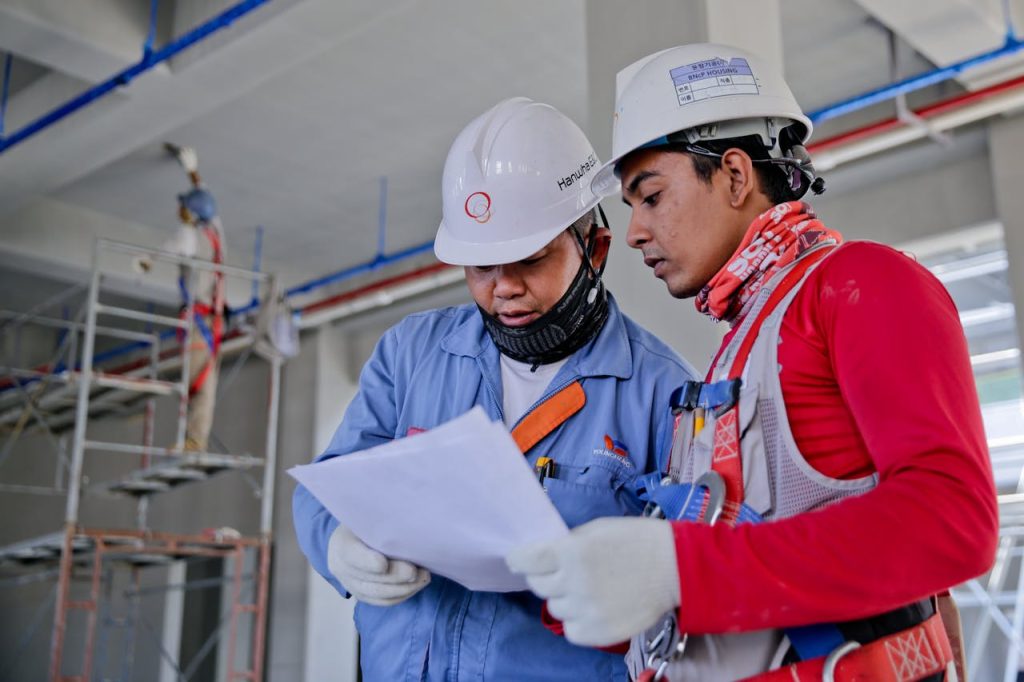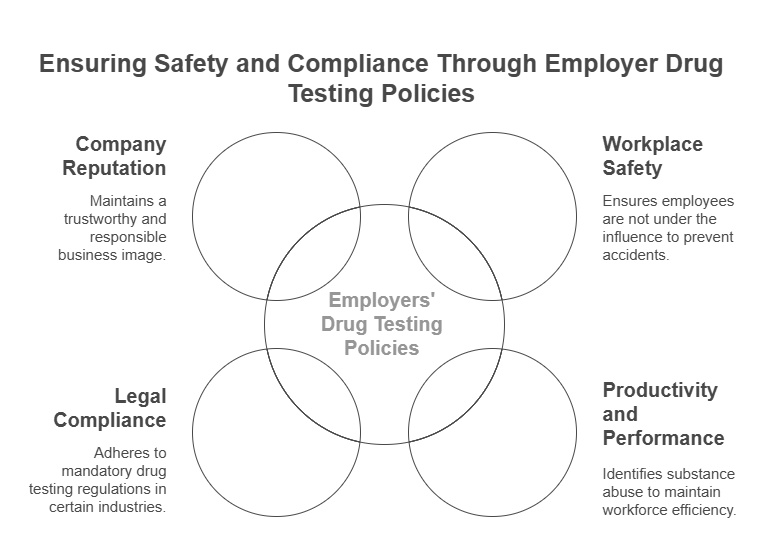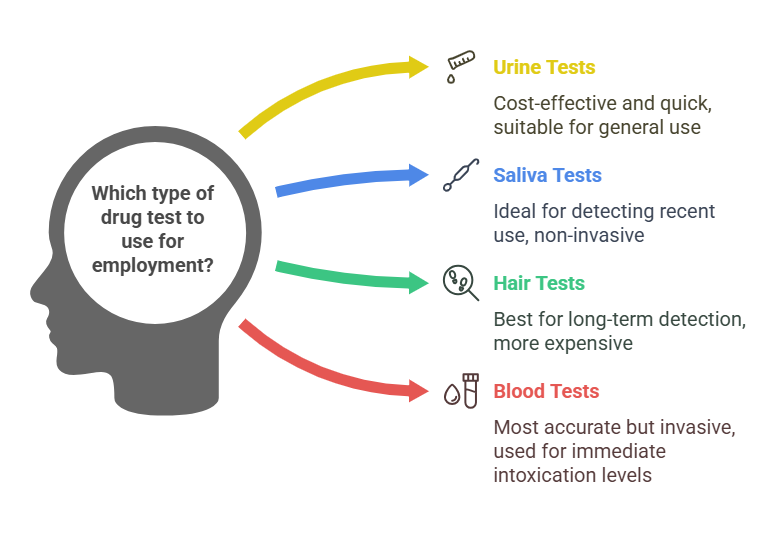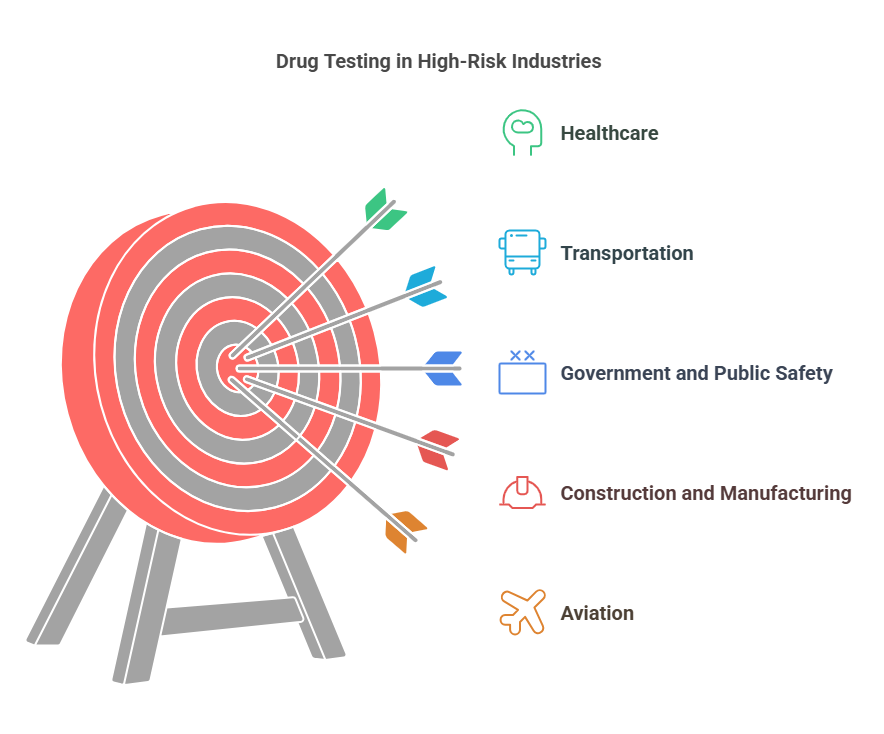Common Jobs That Require Drug Testing

The Role of Drug Testing in Hiring and Employment Practices
Drug testing is a standard practice in many industries, designed to ensure that employees are working in a safe, productive, and compliant environment. As drug use remains a concern in workplaces across the globe, employers use drug tests to screen for substance use that might affect job performance, workplace safety, and overall productivity. Whether a company is ensuring that its workforce is healthy and reliable or adhering to regulatory requirements, drug testing is seen as an essential step in the hiring and ongoing employment processes.
The process of drug testing can be complex, and the requirements vary widely depending on the type of job, the industry, and the jurisdiction. Some employers may test applicants as part of their hiring process, while others may conduct random or scheduled tests during the course of employment. In some cases, employees might be tested after an accident or a specific incident in the workplace to ensure there was no substance abuse involved.
The use of drug testing in employment has become more common as organizations focus on ensuring a drug-free workplace. Companies often choose to implement drug testing for a variety of reasons, ranging from safety concerns to complying with industry regulations.
Why Employers Drug Test

Employers drug test for a variety of reasons, each of which relates to the overall safety, productivity, and legal compliance of their workforce. Some of the key reasons why employers implement drug testing policies include:
- Workplace Safety: Employees who are under the influence of drugs or alcohol may pose a safety risk, especially in jobs involving machinery, driving, or healthcare. Drug testing is particularly important in sectors where accidents can result in serious injury or death.
- Productivity and Performance: Substance abuse can lead to decreased job performance, absenteeism, or even workplace theft. Drug testing helps identify employees who may be under the influence and ensure that the workforce remains productive.
- Legal and Regulatory Compliance: In some industries, drug testing is required by law. For example, federal regulations mandate drug testing for safety-sensitive positions in transportation and public safety.
- Company Image and Reputation: Employers want to protect the reputation of their business and ensure that their employees are trustworthy and responsible. Drug testing helps foster a professional and responsible workforce.
Types of Drug Tests Used in Employment

Drug testing can be conducted in various ways, depending on the nature of the job, the industry, and the specific test requirements. Here are the most common types of drug tests used in employment:
- Urine Tests: The most common form of drug testing, urine tests are inexpensive, quick, and non-invasive. They typically detect substances such as marijuana, cocaine, opiates, and amphetamines.
- Saliva Tests: Saliva tests can detect recent drug use and are often used in roadside drug tests or as part of a random testing program. They can detect substances like marijuana, cocaine, and methamphetamine.
- Hair Tests: Hair follicle tests are used to detect drug use over a longer period, usually up to 90 days. These tests are more expensive but are highly accurate for detecting past drug use.
- Blood Tests: Blood tests are the most accurate, but they are also invasive and costly. They are usually used for detecting substances in the bloodstream, such as alcohol or certain drugs, and are often used in cases of accidents or for determining immediate intoxication levels.
The choice of which type of test to use depends on the nature of the job, the employer’s policy, and the specific regulations within the industry.
General Trends in Drug Testing Across Different Industries
While drug testing is widespread in many sectors, its prevalence varies by industry. Employers in certain fields, such as transportation or healthcare, often require drug testing as part of the hiring process. Other industries, like retail or technology, may not have the same stringent requirements. Below is a general overview of industries where drug testing is most commonly implemented:
- Transportation: Truck drivers, pilots, train operators, and other transportation professionals are often required to undergo drug testing due to safety concerns and federal regulations.
- Healthcare: Healthcare workers, including doctors, nurses, and paramedics, may be tested to ensure they are fit to provide care and prevent substance abuse that could affect patient safety.
- Government and Public Safety: Police officers, firefighters, and other government employees may undergo drug testing to maintain public safety and ensure they can perform their duties effectively.
- Construction and Manufacturing: Employees in these industries may be tested for safety reasons, especially when they are operating heavy machinery or working in high-risk environments.
Industries Where Drug Testing is Most Common

Drug testing is particularly common in industries where safety, security, and regulatory compliance are a top priority. Below, we will explore specific industries where drug testing is common and highlight the job roles that most often require testing.
1. Healthcare
In the healthcare industry, employees must be able to perform their jobs with a high level of responsibility and precision. Drug use can impair an individual’s ability to care for patients, which is why many healthcare organizations require drug testing.
- Job Positions:
- Doctors and Nurses: These professionals are responsible for patient care and making critical decisions. Drug testing helps ensure they are fit for duty and capable of performing their tasks safely.
- Pharmacists: Pharmacists must accurately dispense medications, and drug use could lead to mistakes that harm patients.
- Emergency Medical Technicians (EMTs): EMTs must be alert and capable of responding quickly to emergencies. Drug testing is necessary to ensure their readiness and safety.
2. Transportation
Transportation is one of the most highly regulated industries when it comes to drug testing. This includes all jobs that involve operating vehicles, aircraft, trains, or vessels. Federal laws require certain transportation workers to undergo drug testing regularly to ensure public safety.
- Job Positions:
- Truck Drivers: Federal regulations mandate drug testing for commercial truck drivers, who are required to undergo random, pre-employment, and post-accident testing.
- Pilots: Pilots must be free from drugs and alcohol to ensure the safety of passengers and crew.
- Train Operators: Similar to truck drivers, train operators are also subject to mandatory drug testing to prevent accidents.
- Bus Drivers: Public transportation bus drivers, including those for schools, are frequently tested for drugs due to the safety implications of transporting people.
3. Government and Public Safety
Public safety is another industry where drug testing is crucial. Government employees, including law enforcement officers, firefighters, and military personnel, need to be drug-free to ensure they can perform their duties without impairment.
- Job Positions:
- Police Officers: Police officers are often required to pass drug tests, both before hiring and during employment, to ensure they can perform their duties without impairments.
- Firefighters: Firefighters face high-stress situations and must remain alert at all times. Drug testing is essential to ensure their fitness for duty.
- Military Personnel: Service members are subject to random drug testing to ensure operational readiness and maintain safety in critical missions.
4. Construction and Manufacturing
Safety is paramount in construction and manufacturing industries, where workers often operate heavy machinery and work in hazardous environments. Drug testing helps reduce the risk of accidents and ensures that workers are fit for the tasks at hand.
- Job Positions:
- Heavy Equipment Operators: Operating cranes, bulldozers, and other heavy machinery requires focus and skill. Drug testing ensures that operators are not impaired on the job.
- Construction Workers: Workers on construction sites may be required to pass drug tests due to the potential dangers associated with heavy lifting, heights, and other hazardous tasks.
- Manufacturing Workers: Workers in production or assembly line jobs must be drug-free to avoid accidents or errors in the manufacturing process.
5. Aviation
Aviation is another high-risk industry where drug testing is essential for safety. Pilots, air traffic controllers, and other aviation personnel undergo drug testing to ensure they are free from any substances that could affect their performance.
- Job Positions:
- Airline Pilots: Pilots are required to pass strict drug tests to ensure they are fit to fly.
- Air Traffic Controllers: Air traffic controllers must remain alert and focused on guiding flights safely; therefore, drug testing is a critical part of their employment.
Drug Testing Table
| Industry | Common Job Positions | Drug Test Requirements |
|---|---|---|
| Healthcare | Doctors, Nurses, EMTs, Pharmacists | Pre-employment, Random, Post-incident |
| Transportation | Truck Drivers, Pilots, Train Operators, Bus Drivers | Pre-employment, Random, Post-incident |
| Public Safety | Police Officers, Firefighters, Military Personnel | Pre-employment, Random, Post-incident |
| Construction | Heavy Equipment Operators, Construction Workers | Pre-employment, Random, Post-incident |
| Aviation | Airline Pilots, Air Traffic Controllers | Pre-employment, Random, Post-incident |
Legal Aspects of Drug Testing in Employment
Employers are required to adhere to specific laws and regulations when conducting drug tests on employees and job applicants. Understanding these regulations is essential for ensuring that the drug testing process is conducted ethically, fairly, and in compliance with legal standards.
1. Federal and State Regulations
Several federal and state laws govern drug testing in the workplace, including the Drug-Free Workplace Act and the Americans with Disabilities Act (ADA). These laws ensure that drug testing is carried out fairly and without discrimination.
- Drug-Free Workplace Act: This federal law requires certain employers (e.g., those with federal contracts or grants) to maintain a drug-free workplace and implement drug testing policies.
- Americans with Disabilities Act (ADA): The ADA prevents discrimination against individuals with disabilities, including those recovering from substance abuse. It mandates that drug testing should be done fairly and without violating an individual’s rights.
2. Employee Rights and Consequences of Failing a Drug Test
Employees have rights regarding drug testing, including the right to be informed of testing procedures and to dispute test results. However, failing a drug test can have significant consequences, including termination or disqualification from employment.
FAQs
Why do employers conduct drug testing in the workplace?
Employers drug test for reasons including:
- Workplace Safety: To prevent accidents and ensure a safe work environment.
- Productivity and Performance: To maintain productivity and reduce absenteeism.
- Legal and Regulatory Compliance: To adhere to federal and state laws.
- Company Image and Reputation: To protect the business's reputation and ensure a trustworthy workforce.
What are the common types of drug tests used in employment?
Common drug tests include:
- Urine Tests: Most common, inexpensive, and quick.
- Saliva Tests: Detect recent drug use, often used for roadside or random testing.
- Hair Tests: Detect drug use over a longer period (up to 90 days).
- Blood Tests: Most accurate, but invasive and costly, used for immediate intoxication levels.
In what industries is drug testing most commonly implemented?
Drug testing is common in:
- Healthcare: Doctors, nurses, and EMTs.
- Transportation: Truck drivers, pilots, and train operators.
- Government and Public Safety: Police officers, firefighters, and military personnel.
- Construction and Manufacturing: Heavy equipment operators and construction workers.
- Aviation: Airline pilots and air traffic controllers.
What legal aspects govern drug testing in employment?
Legal aspects include:
- Federal and State Regulations: Drug-Free Workplace Act and Americans with Disabilities Act (ADA).
- Employee Rights: Right to be informed of testing procedures and dispute results.
- Consequences of Failing a Drug Test: Potential termination or disqualification from employment.
How does the type of job and industry influence the choice of drug testing method?
The choice depends on:
- Nature of the Job: Safety-sensitive roles often require more rigorous testing.
- Employer's Policy: Company-specific guidelines dictate testing procedures.
- Industry Regulations: Federal and state laws mandate testing for certain industries.
For example, transportation often requires urine tests due to DOT regulations, while healthcare may use hair tests for long-term substance use history.
Why do employers conduct drug testing in the workplace?
Employers drug test for reasons including:
- Workplace Safety: To prevent accidents and ensure a safe work environment.
- Productivity and Performance: To maintain productivity and reduce absenteeism.
- Legal and Regulatory Compliance: To adhere to federal and state laws.
- Company Image and Reputation: To protect the business's reputation and ensure a trustworthy workforce.
What are the common types of drug tests used in employment?
Common drug tests include:
- Urine Tests: Most common, inexpensive, and quick.
- Saliva Tests: Detect recent drug use, often used for roadside or random testing.
- Hair Tests: Detect drug use over a longer period (up to 90 days).
- Blood Tests: Most accurate, but invasive and costly, used for immediate intoxication levels.
In what industries is drug testing most commonly implemented?
Drug testing is common in:
- Healthcare: Doctors, nurses, and EMTs.
- Transportation: Truck drivers, pilots, and train operators.
- Government and Public Safety: Police officers, firefighters, and military personnel.
- Construction and Manufacturing: Heavy equipment operators and construction workers.
- Aviation: Airline pilots and air traffic controllers.
What legal aspects govern drug testing in employment?
Legal aspects include:
- Federal and State Regulations: Drug-Free Workplace Act and Americans with Disabilities Act (ADA).
- Employee Rights: Right to be informed of testing procedures and dispute results.
- Consequences of Failing a Drug Test: Potential termination or disqualification from employment.
How does the type of job and industry influence the choice of drug testing method?
The choice depends on:
- Nature of the Job: Safety-sensitive roles often require more rigorous testing.
- Employer's Policy: Company-specific guidelines dictate testing procedures.
- Industry Regulations: Federal and state laws mandate testing for certain industries.
For example, transportation often requires urine tests due to DOT regulations, while healthcare may use hair tests for long-term substance use history.
Conclusion
Drug testing is an important tool for employers to ensure workplace safety, productivity, and regulatory compliance. Various industries, especially those involving high-risk activities or sensitive positions, commonly require drug tests. By understanding the job positions and industries where drug testing is most common, as well as the legal considerations involved, both employers and employees can navigate the hiring process with greater clarity.
For employers, using a service like Exact Background Checks ensures that drug testing and other employment screening processes are handled efficiently and in compliance with legal regulations.



